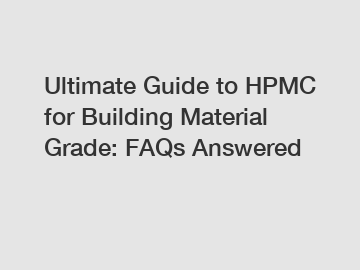Ultimate Guide to HPMC for Building Material Grade: FAQs Answered
Welcome to the Ultimate Guide to HPMC for Building Material Grade: FAQs Answered. If you're in the construction industry, you've likely come across Hydroxypropyl Methylcellulose (HPMC) in building materials. This versatile polymer is commonly used in a wide range of construction applications due to its unique properties. In this comprehensive guide, we'll answer some of the most frequently asked questions about HPMC for building material grade.
Q: What is HPMC?
A: HPMC, or Hydroxypropyl Methylcellulose, is a synthetic polymer derived from cellulose. It is commonly used in the construction industry as a thickening agent, binder, and film former in building materials such as mortar, stucco, and tile adhesives.

Q: What are the key properties of HPMC for building material grade?
A: HPMC has several key properties that make it an ideal choice for building materials. It has excellent water retention capacity, which helps improve workability and durability of construction materials. HPMC also provides good adhesion and cohesion, enhancing the bonding strength of building materials. Additionally, HPMC is compatible with a wide range of other additives and chemicals commonly used in construction.
Q: How is HPMC used in building materials?
A: HPMC is commonly used in building materials as a thickening agent, binder, and film former. In mortar and stucco, HPMC helps improve workability and adhesion, resulting in smoother finishes and better overall performance. In tile adhesives, HPMC enhances the bonding strength and water retention capacity, ensuring tiles stay in place and adhere properly.
Q: What are the benefits of using HPMC in building materials?
A: There are several benefits to using HPMC in building materials. These include improved workability, increased durability, enhanced bonding strength, and reduced cracking and shrinkage. HPMC also helps reduce the amount of water needed in construction materials, leading to cost savings and improved sustainability.
Q: How do I choose the right grade of HPMC for my building materials?
A: When selecting HPMC for building materials, it's important to consider factors such as viscosity, particle size, and hydroxypropyl content. Different grades of HPMC are available to meet the specific requirements of different construction applications. Consulting with a knowledgeable supplier or manufacturer can help you choose the right grade of HPMC for your specific needs.
Q: Are there any environmental concerns associated with using HPMC in building materials?
A: HPMC is considered to be a safe and environmentally friendly ingredient in building materials. It is non-toxic, biodegradable, and does not release harmful chemicals into the environment when used. Additionally, HPMC helps reduce the amount of water needed in construction materials, which can have a positive impact on water conservation efforts.
Q: Can HPMC be used in combination with other additives in building materials?
A: Yes, HPMC is compatible with a wide range of other additives commonly used in construction materials. It can be combined with polymers, thickeners, fillers, and other chemicals to enhance the performance of building materials. Consulting with a knowledgeable supplier or manufacturer can help you determine the best combination of additives for your specific application.
In conclusion, HPMC is a versatile and highly beneficial ingredient in building materials. Its unique properties make it an ideal choice for improving workability, durability, and performance of construction materials. By understanding the key properties and benefits of HPMC, you can make informed decisions when choosing the right grade for your specific application. Consult with a trusted supplier or manufacturer to learn more about how HPMC can enhance your building materials and construction projects.
If you want to learn more, please visit our website hydroxypropyl methylcellulose powder, pp fibers, gypsum retarder chemical.
190
0
0

Comments
All Comments (0)